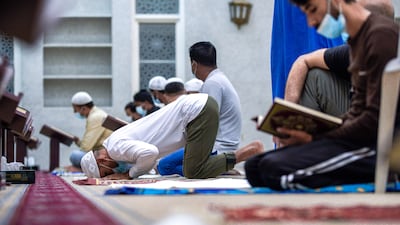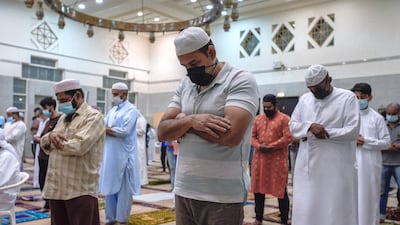Millions of Muslims around the world share a ritual known as salah, meaning prayer, which they are to repeat at least five times a day.
On each occasion, worshippers stand facing the holy Kaaba in Makkah and perform the steps of salah as taught by the Prophet Mohammed.
As the word indicates in Arabic, salah, which translates as connection, is designed to directly link devotees to their creator.
Why do Muslims pray?
When performing the prayer, an individual is considered to be standing in the hands of God and addressing Him in person.
Praying five times a day is obligatory for every adult Muslim who is physically and mentally capable of doing so.
The times of prayer are spread throughout the day so that worshippers are able to continually maintain their connection to God.
When do Muslims pray?
The first prayer, called fajr, starts at dawn and ends once the sun rises. The second set of prayers is known as dhuhr and starts at noon.
That is followed by the afternoon prayer, asr, while at sunset Muslims pray maghrib, and in the evening, isha.
According to the Quran, the Prophet Mohammed was given instructions on salah by God during his ascension to heaven.
Initially, worshippers were told to pray 50 times a day, but the Prophet Musa – Moses – later asked the Prophet Mohammed to ask God to reduce the number.
Eventually, the figure was shrunk to five times a day, but the reward still counts as 50.
“To perform salah we have to listen and follow many rules,” said Mohammad Moin-Al Deen, an imam in Abu Dhabi since 1998.
“So for five times a day, people are following Allah’s orders silently. Also, from my experience, if a person is very hyper and never listens to others, once he commits to prayer it calms him down and he becomes more focused.
“Even non-Muslims practise a component of salah, and that is meditation.”
What is the value of prayer?
Mr Moin-Al Deen began leading prayers at his local mosque at the age of 10 and recommends that children become accustomed to prayer early on.
He said the value of salah not only reflected on individuals following their death, but also made them a better person in life. It taught patience and discipline, he said.
“When we see young people coming to the masjid [mosque] I personally become very happy and I start conversations with them about their studies and if they know how to read Quran,” he said.
Ameera Al Muhairi has been praying five times a day since she was in third grade.
“I used to pray with my mother and so every time she performed ablution and prayed I did the same,” said the 28-year-old Emirati.
“And as I was growing up we always used to do it as a group. Me and my cousins went to the mosque together in Ramadan and to Makkah for Umrah.”
As she grew up, Ms Al Muhairi continued to enjoy the practice of praying. She gradually became more aware of its impact on her daily life.
“It is like feeling the presence of God and the connection with Him,” she said. “I don’t ask Him for things, I just feel like I want to get strength from Him and to feel His protection.
“I feel lighter during Ramadan, even though I am tired and sleep-deprived. I feel I am fasting for a purpose.
“To me, it is not an obligation that I must do, but something that I want to do.”
Similarly, Mohammed Al Daqqaq, 34, who has prayed regularly since the 12th grade, said he had seen the benefits of salah first-hand.
“At that time, I was going through the final year of high school, which is very challenging in Jordan,” he said.
“So I calmed down that year and wasn’t going out so often. I was committed to studying and being responsible.
“I became friends with a group of guys who were devout Muslims and we started praying together.”
Once he passed his high school exams, he decided to remain committed to salah.
“I saw how God gave me success, so I continued to pray throughout university and then it became a lifestyle for me.
“Every time I would think of doing something wrong, I would remember the Quranic verse: “And be constant in prayer: for, behold, prayer restrains [man] from loathsome deeds and from all that runs counter to reason.”
He said he also worried that his salah could be rejected if he were to commit wrongdoing.
“When a person feels the connection with God, he will think twice before harming others or back-stabbing someone at work, for instance,” he said.
“When an option to do good comes my way, I feel encouraged to do it. I remind myself that it will make me a better person.”
*A version of this article was first published on May 13, 2019













